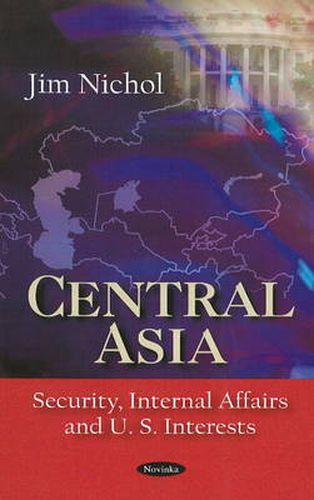Readings Newsletter
Become a Readings Member to make your shopping experience even easier.
Sign in or sign up for free!
You’re not far away from qualifying for FREE standard shipping within Australia
You’ve qualified for FREE standard shipping within Australia
The cart is loading…






The Central Asian states (Kazakhstan, Kyrgyzstan, Tajikistan, Turkmenistan, and Uzbekistan) face common security challenges from crime, corruption, terrorism, and faltering commitments to economic and democratic reforms. However, co-operation among them remains halting, so security in the region is likely in the near term to vary by country. Kyrgyzstan’s and Tajikistan’s futures are most clouded by ethnic and territorial tensions, and corruption in Kazakhstan and Turkmenistan could spoil benefits from the development of their ample energy resources. Authoritarianism and poverty in Uzbekistan could contribute to a succession crisis. On the other hand, Kyrgyzstan’s growing but still fragile civil society might help the relatively small nation safeguard its independence. Uzbekistan might become a regional power able to take the lead on policy issues common to Central Asia and to resist undue influence from more powerful outside powers, because of its large territory and population (55 million) and energy and other resources. Internal political developments in several bordering or close-by states may have a large impact on Central Asian security. These developments include a more authoritarian and globalist Russia, ethnic and political instability in China and Iran, and re-surging drug production and Islamic extremism in Afghanistan. Since the September 11, 2001, terrorist attacks on the United States, the Administration has established bases and other military access in the region for U.S.-led coalition actions in Afghanistan, and it has stressed that the United States will remain interested in the long-term security and stability of the region. U.S. interests in Central Asia include fostering democratisation, human rights, free markets, and trade; assisting the development of oil and other resources; and combating terrorism, the proliferation of weapons of mass destruction, and drug production and trafficking. The United States seeks to thwart dangers posed to its security by the illicit transfer of strategic missile, nuclear, biological, and chemical weapons technologies, materials, and expertise to terrorist states or groups, and to address threats posed to regional independence by Iran. Some critics counter that the United States has historically had few interests in this region, and advocate only limited U.S. contacts undertaken with Turkey and other friends and allies to ensure U. S. goals. They also argue that the region’s energy resources may not measurably enhance U.S. energy security. Most in Congress have supported U.S. assistance to bolster independence and reforms in Central Asia. The 106th Congress authorised a Silk Road initiative for greater policy attention and aid for democratisation, market reforms, humanitarian needs, conflict resolution, transport infrastructure (including energy pipelines), and border controls.
$9.00 standard shipping within Australia
FREE standard shipping within Australia for orders over $100.00
Express & International shipping calculated at checkout
The Central Asian states (Kazakhstan, Kyrgyzstan, Tajikistan, Turkmenistan, and Uzbekistan) face common security challenges from crime, corruption, terrorism, and faltering commitments to economic and democratic reforms. However, co-operation among them remains halting, so security in the region is likely in the near term to vary by country. Kyrgyzstan’s and Tajikistan’s futures are most clouded by ethnic and territorial tensions, and corruption in Kazakhstan and Turkmenistan could spoil benefits from the development of their ample energy resources. Authoritarianism and poverty in Uzbekistan could contribute to a succession crisis. On the other hand, Kyrgyzstan’s growing but still fragile civil society might help the relatively small nation safeguard its independence. Uzbekistan might become a regional power able to take the lead on policy issues common to Central Asia and to resist undue influence from more powerful outside powers, because of its large territory and population (55 million) and energy and other resources. Internal political developments in several bordering or close-by states may have a large impact on Central Asian security. These developments include a more authoritarian and globalist Russia, ethnic and political instability in China and Iran, and re-surging drug production and Islamic extremism in Afghanistan. Since the September 11, 2001, terrorist attacks on the United States, the Administration has established bases and other military access in the region for U.S.-led coalition actions in Afghanistan, and it has stressed that the United States will remain interested in the long-term security and stability of the region. U.S. interests in Central Asia include fostering democratisation, human rights, free markets, and trade; assisting the development of oil and other resources; and combating terrorism, the proliferation of weapons of mass destruction, and drug production and trafficking. The United States seeks to thwart dangers posed to its security by the illicit transfer of strategic missile, nuclear, biological, and chemical weapons technologies, materials, and expertise to terrorist states or groups, and to address threats posed to regional independence by Iran. Some critics counter that the United States has historically had few interests in this region, and advocate only limited U.S. contacts undertaken with Turkey and other friends and allies to ensure U. S. goals. They also argue that the region’s energy resources may not measurably enhance U.S. energy security. Most in Congress have supported U.S. assistance to bolster independence and reforms in Central Asia. The 106th Congress authorised a Silk Road initiative for greater policy attention and aid for democratisation, market reforms, humanitarian needs, conflict resolution, transport infrastructure (including energy pipelines), and border controls.